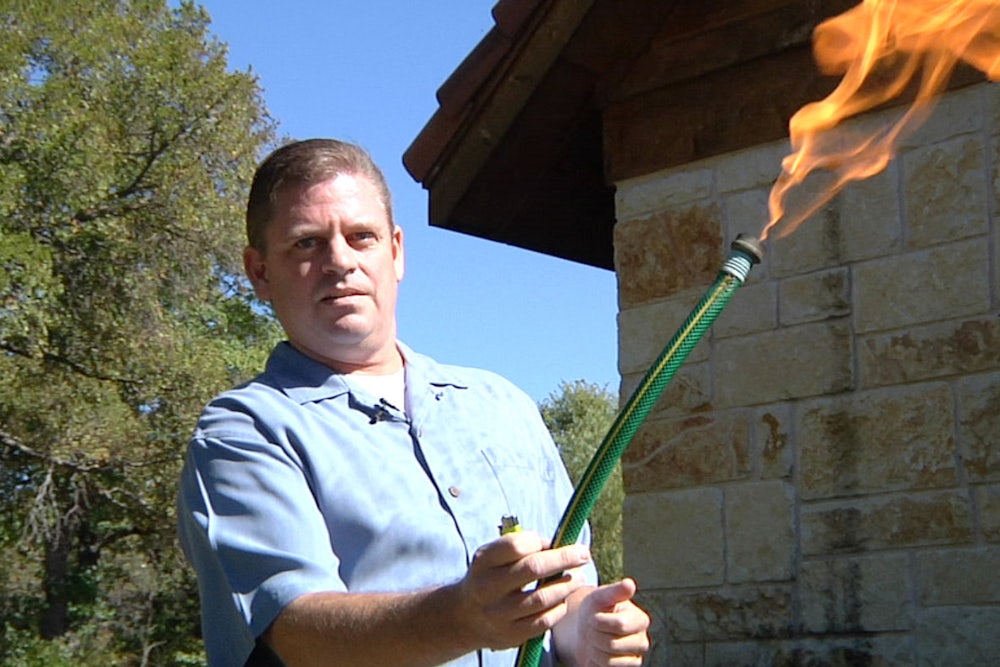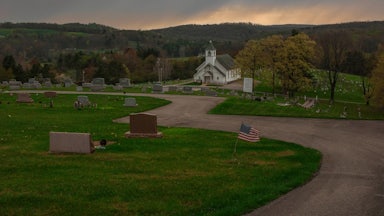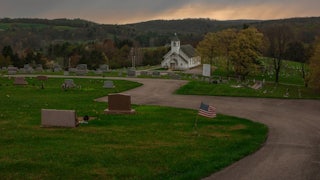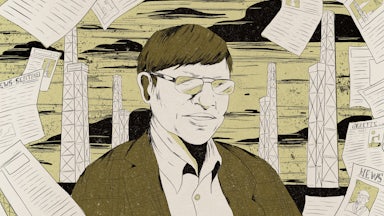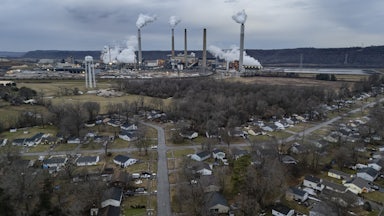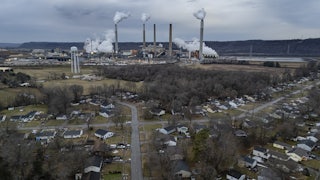More than a dozen years after the controversial documentary Gasland made Dimock, Pennsylvania, the poster child for the dangers of fracking, the successor to the company responsible for poisoning residents’ drinking water pleaded no contest to violating the state’s Clean Stream Law, on November 29, 2022. As a part of the plea, Coterra Energy must pay to construct a new, permanent supply of water for residents, some of whose private water wells became laced with carcinogenic chemicals and contained methane concentrations so high that running faucets could be set on fire. “After more than a decade of denials, of shirking responsibility and accountability, Coterra pleaded to their crime, and the people of Dimock finally had their day in court,” crowed Pennsylvania Attorney General and Governor-elect Josh Shapiro, who launched the investigation that resulted in the settlement.
It seemed like a turning point. Shapiro, who convened a grand jury in 2018 to investigate the petroleum industry’s and the state Department of Environmental Protection’s endangerment of Pennsylvania residents, was poised to move into the governor’s mansion. Public opinion in the state had tilted toward support for a ban on fracking.
But on the same day Shapiro held his ballyhooed press conference to announce the deal, the DEP quietly lifted a moratorium on fracking in Dimock that had been in place since 2010. (State officials called the timing coincidental and denied any quid pro quo with Coterra.) “We got played,” Dimock resident Ray Kemble told the Associated Press only hours after he triumphantly stood on the dais with Shapiro. Yet a Susquehanna County commissioner claimed that many of his constituents in Dimock actually supported the resumption of gas drilling.
Bureaucrats and some locals’ willingness to restart gas production at the site of the country’s most infamous fracking-related catastrophe is emblematic of Pennsylvania’s conflicted relationship to the industry. And it maps onto the state’s rural/urban political divide.
As polarizing as fracking is today, it’s worth remembering that for most of the 2010s it enjoyed strong bipartisan support, both in Pennsylvania and nationally. (The outlier is New York, which in 2014 became the only state with sizable gas deposits to ban fracking.) Democratic governor and former Philadelphia mayor Ed Rendell was the one to facilitate the fracking boom in Pennsylvania, auctioning off the mineral rights to over 130,000 acres of public land. He also supported a so-called pooling law that would have forced some landowners to lease their subsurface estate to drilling companies (it didn’t pass). In his 2012 State of the Union address, President Obama framed fracking as a silver bullet that could unlock enough shale gas to supply cheap, domestic energy to Americans for a century while creating hundreds of thousands of well-paying union jobs—all while lowering carbon emissions since methane burns “cleaner” than coal. In a 2018 speech at Rice University, Obama patted himself on the back: “Suddenly, America’s like the biggest oil producer and the biggest gas [producer]; that was me, people.”
Fracking offered the tantalizing prospect of returning deindustrialized heartland communities in Pennsylvania and the Midwest to their glory days. What’s more, “landmen” hired by petroleum companies to secure rural landowners’ mineral rights routinely peddled the fantasy that allowing fracking under their feet could make land-poor residents “richer than Jed Clampett” of The Beverly Hillbillies, in the words of one Williamsport-area landowner I befriended when I lived there in 2013.
The tragedy of Dimock, which reached its nadir when a resident’s water well exploded on New Year’s Day in 2009, became the central story of Josh Fox’s Emmy Award–winning documentary Gasland, which in turn turbocharged the nascent anti-fracking movement in Pennsylvania and around the country. Curiously, though, “fractivism” never caught on in most of the locales where gas and oil drilling actually takes place. Even as more and more Pennsylvanians, and Americans, express serious misgivings about the industry, research indicates that people who live closer to oil and gas wells are less likely to support restrictions on fracking than people who live further away. Fractivism is mostly a not in your backyard movement spearheaded by progressives living in urban and coastal areas. That’s certainly how it felt to friends of mine in Hughesville, Pennsylvania, when Yoko Ono’s activist group “Artists Against Fracking” chartered a tour bus from New York City to the region to draw attention to alleged industry malfeasance.
I followed five families in Hughesville who suffered a fate similar to Dimock’s after a gas well was drilled on a neighbor’s property: Their water fizzed like soda and turned brown or pink. The families were livid that the offending drilling company denied responsibility. Although they sued the firm, they refused to conclude from their experience that greater government oversight of fracking was needed. They prized self-reliance and land sovereignty and didn’t trust the DEP—or any other bureaucracy—any more than the petroleum company that tainted their water. They refused to align themselves with anti-fracking environmentalists whom they saw as “outsiders” who had no clue about “rural values.”
Such antiestablishment and anti-liberal views are common in rural Pennsylvania, where Trump carried over 60 percent of the vote in 2020, despite narrowly losing the state. (Trump won 70 percent of the vote in Susquehanna County, where Dimock is located.) If rural Pennsylvania had a credo, it would be “Live and let live.” It’s a world away from Shapiro’s home base of greater Philadelphia, and it’s a world where the patriotic promise of “energy independence” and “American jobs” holds tremendous sway.
Even though Tom and Mary Crawley’s water in Hughesville still gurgles with methane, they told me they might consider leasing their land again to the drilling company that contaminated their water. Tom said it would be just their luck to reject a new lease and then learn that it was a productive well that would pay out handsome royalties. This is the same attitude as that of the Dimock residents who support the resumption of gas drilling. “They know the gas in that area is very prolific … and they’d been hoping a resolution would come through, that their leases would be activated again and they’d start being able to get royalties out of the process,” the vice chair of the Susquehanna County Board of Commissioners told the Associated Press in December. It’s also worth noting that Coterra will only be able to drill horizontally more than a mile below the surface in Dimock, from wells that must originate outside of the area; just about every instance of contamination associated with drilling occurs on the vertical portion of the well, not the horizontal portion. Even a wealthy anti-fracking advocate I know who lives on 150 bucolic acres protected by a conservation easement eventually allowed horizontal drilling beneath her estate. She didn’t need the money, but she saw the leasing bonus as restitution for the quality of life disturbances she had endured for years because of surface drilling on her neighbors’ properties. Royalties may be the only form of restitution possible for many Dimock residents as well.
Most progressive politicians in America now denounce fracking and advocate for a rapid transition to renewable energy. Democrats in Pennsylvania, however, step gingerly around the issue for fear of alienating rural, working-class whites or being labeled a jobs-killer. This explains why John Fetterman was compelled to say that he “absolutely supports” fracking and energy independence during his heated Senate campaign against Dr. Oz, even though he’d previously advocated for a moratorium on new drilling. It’s why Shapiro settled on the awkward stance of supporting “responsible fracking” when he ran for governor after prosecuting the industry and lambasting its safety record for the previous four years. It also helps explain why the DEP, even under a Democratic governor, Tom Wolf, made the decision to allow fracking to restart in Dimock.
The notion that fracking is a golden goose, though, is mostly based on lies from the industry and its conservative allies. In Pennsylvania and other states, boosters systematically exaggerated the industry’s impact on employment, often by counting “ancillary jobs” (like UPS driver) that predated fracking. In 2012, the U.S. Chamber of Commerce claimed that shale gas production had created more than 300,000 new jobs in Pennsylvania, Ohio, and West Virginia. The Pennsylvania Department of Labor and Industry counted only about 18,000. In 2020, Trump and his allies claimed that fracking had created anywhere from 600,000 to 940,000 new jobs in Pennsylvania; the actual number was more like 26,000. Bombshell investigations by the Ohio River Valley Institute show that the Ohio, Pennsylvania, and West Virginia counties that produce 90 percent of the region’s fracked gas experienced less job growth and gains in prosperity than similar regions where fracking is not occurring and that fracking has failed to stem or even slow job and population losses in rural Pennsylvania. In other words, there’s evidence that fracking has made local economies worse off than they would have been otherwise.
Fracking is bad for Pennsylvania, the country, and the planet. Oil and gas drilling has poisoned drinking water sources, made families sick, exacerbated climate change, and failed to reverse the declining economic fortunes of the Rust Belt. Most Pennsylvania residents support a ban. As attorney general, Governor-elect Shapiro stood up to the oil and gas industry and took the DEP to task for failing to uphold residents’ constitutional right to clean air and water. When a reporter asked at his celebratory news conference last November whether Coterra should be allowed to drill again in Dimock, Shapiro deflected by stating that it’s a “question for regulators, not for the attorney general’s office” and noting that Tom Wolf was still governor. Now it’s only a matter of days until Shapiro is in charge. Once sworn in on January 17, will he prioritize Pennsylvanians’ health and natural resources, or will he cave to the gas industry and the people it has deceived, like politicians before him? Watch what happens next in Dimock to find out.
